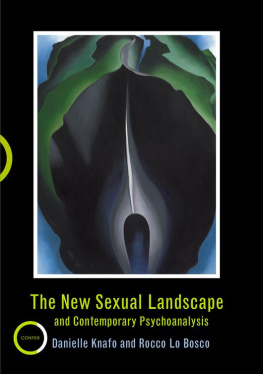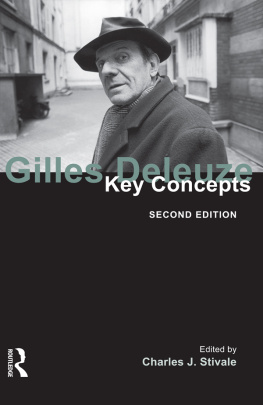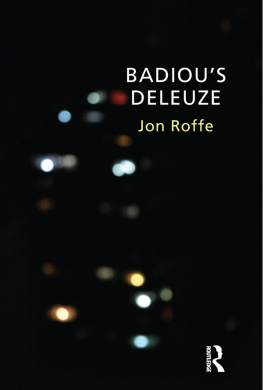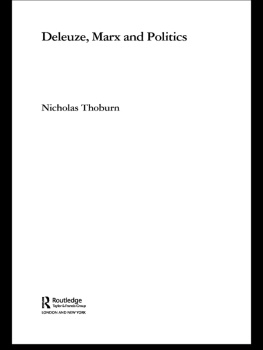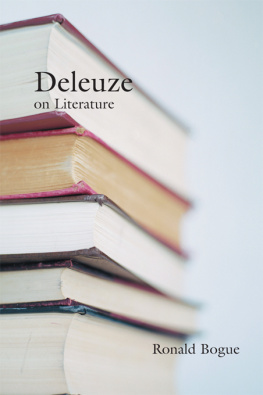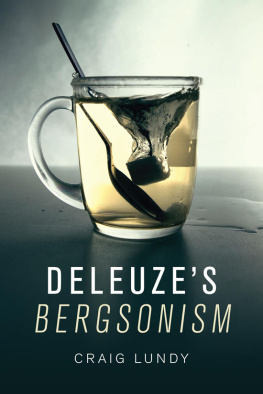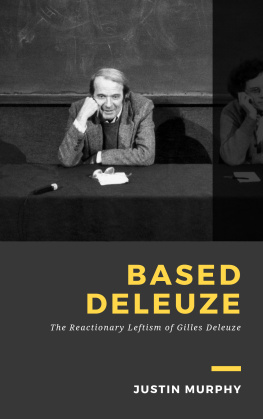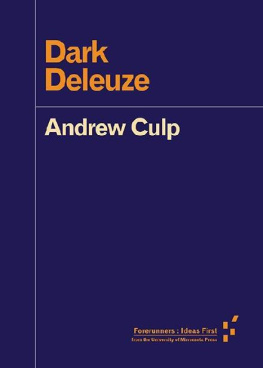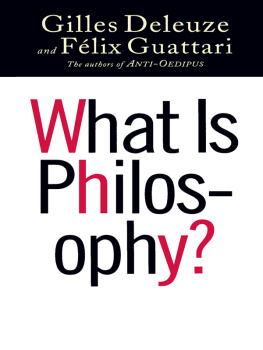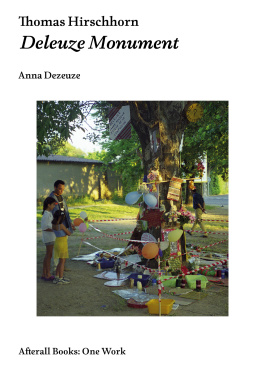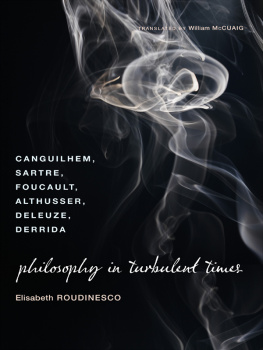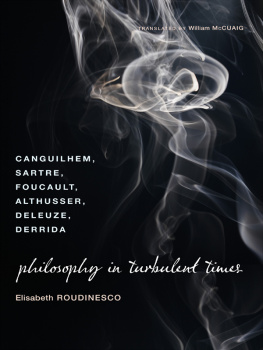Schuster - The Trouble with Pleasure: Deleuze and Psychoanalysis
Here you can read online Schuster - The Trouble with Pleasure: Deleuze and Psychoanalysis full text of the book (entire story) in english for free. Download pdf and epub, get meaning, cover and reviews about this ebook. year: 2016, publisher: The MIT Press, genre: Science. Description of the work, (preface) as well as reviews are available. Best literature library LitArk.com created for fans of good reading and offers a wide selection of genres:
Romance novel
Science fiction
Adventure
Detective
Science
History
Home and family
Prose
Art
Politics
Computer
Non-fiction
Religion
Business
Children
Humor
Choose a favorite category and find really read worthwhile books. Enjoy immersion in the world of imagination, feel the emotions of the characters or learn something new for yourself, make an fascinating discovery.

The Trouble with Pleasure: Deleuze and Psychoanalysis: summary, description and annotation
We offer to read an annotation, description, summary or preface (depends on what the author of the book "The Trouble with Pleasure: Deleuze and Psychoanalysis" wrote himself). If you haven't found the necessary information about the book — write in the comments, we will try to find it.
Schuster: author's other books
Who wrote The Trouble with Pleasure: Deleuze and Psychoanalysis? Find out the surname, the name of the author of the book and a list of all author's works by series.
The Trouble with Pleasure: Deleuze and Psychoanalysis — read online for free the complete book (whole text) full work
Below is the text of the book, divided by pages. System saving the place of the last page read, allows you to conveniently read the book "The Trouble with Pleasure: Deleuze and Psychoanalysis" online for free, without having to search again every time where you left off. Put a bookmark, and you can go to the page where you finished reading at any time.
Font size:
Interval:
Bookmark:
THE TROUBLE WITH PLEASURE
SHORT CIRCUITS
Mladen Dolar, Alenka Zupani, and Slavoj iek, editors
The Puppet and the Dwarf: The Perverse Core of Christianity, by Slavoj iek
The Shortest Shadow: Nietzsches Philosophy of the Two, by Alenka Zupani
Is Oedipus Online? Siting Freud after Freud, by Jerry Aline Flieger
Interrogation Machine: Laibach and NSK, by Alexei Monroe
The Parallax View, by Slavoj iek
A Voice and Nothing More, by Mladen Dolar
Subjectivity and Otherness: A Philosophical Reading of Lacan, by Lorenzo Chiesa
The Odd One In: On Comedy, by Alenka Zupani
The Monstrosity of Christ: Paradox or Dialectic? by Slavoj iek and John Milbank, edited by Creston Davis
Interface Fantasy: A Lacanian Cyborg Ontology, by Andr Nusselder
Lacan at the Scene, by Henry Bond
Laughter: Notes on a Passion, by Anca Parvulescu
All for Nothing: Hamlets Negativity, by Andrew Cutrofello
The Trouble with Pleasure: Deleuze and Psychoanalysis, by Aaron Schuster
THE TROUBLE WITH PLEASURE
DELEUZE AND PSYCHOANALYSIS
Aaron Schuster
THE MIT PRESS CAMBRIDGE, MASSACHUSETTS LONDON, ENGLAND
2016 Massachusetts Institute of Technology
All rights reserved. No part of this book may be reproduced in any form by any electronic or mechanical means (including photocopying, recording, or information storage and retrieval) without permission in writing from the publisher.
Library of Congress Cataloging-in-Publication Data
Names: Schuster, Aaron, 1974 author.
Title: The trouble with pleasure : Deleuze and psychoanalysis / Schuster, Aaron.
Description: Cambridge, MA : The MIT Press, 2016. | Series: Short circuits | Includes bibliographical references.
Identifiers: LCCN 2015038372 | ISBN 9780262528597 (pbk)
Subjects: LCSH: Deleuze, Gilles, 19251995. | PsychoanalysisSocial aspects.
Classification: LCC BF175 .S3868 2016 | DDC 150.19/5dc23 LC record available at http://lccn.loc.gov/2015038372
10 9 8 7 6 5 4 3 2 1
For Stewart A. Schuster and Helen H. Schuster, in memory
CONTENTS
SERIES FOREWORD
A short circuit occurs when there is a faulty connection in the networkfaulty, of course, from the standpoint of the networks smooth functioning. Is not the shock of short-circuiting, therefore, one of the best metaphors for a critical reading? Is not one of the most effective critical procedures to cross wires that do not usually touch: to take a major classic (text, author, notion) and read it in a short-circuiting way, through the lens of a minor author, text, or conceptual apparatus (minor should be understood here in Deleuzes sense: not of lesser quality, but marginalized, disavowed by the hegemonic ideology, or dealing with a lower, less dignified topic)? If the minor reference is well chosen, such a procedure can lead to insights which completely shatter and undermine our common perceptions. This is what Marx, among others, did with philosophy and religion (short-circuiting philosophical speculation through the lens of political economy, that is to say, economic speculation); this is what Freud and Nietzsche did with morality (short-circuiting the highest ethical notions through the lens of the unconscious libidinal economy). What such a reading achieves is not a simple desublimation, a reduction of the higher intellectual content to its lower economic or libidinal cause; the aim of such an approach is, rather, the inherent decentering of the interpreted text, which brings to light its unthought, its disavowed presuppositions and consequences.
And this is what Short Circuits wants to do, again and again. The underlying premise of the series is that Lacanian psychoanalysis is a privileged instrument of such an approach, whose purpose is to illuminate a standard text or ideological formation, making it readable in a totally new waythe long history of Lacanian interventions in philosophy, religion, the arts (from the visual arts to the cinema, music, and literature), ideology, and politics justifies this premise. This, then, is not a new series of books on psychoanalysis, but a series of connections in the Freudian fieldof short Lacanian interventions in art, philosophy, theology, and ideology. Short Circuits intends to revive a practice of reading which confronts a classic text, author, or notion with its own hidden presuppositions, and thus reveals its disavowed truth. The basic criterion for the texts that will be published is that they effectuate such a theoretical short circuit. After reading a book in this series, the reader should not simply have learned something new: the point is, rather, to make him or her aware of anotherdisturbingside of something he or she knew all the time.
Slavoj iek
PREFACE
CRITIQUE OF PURE COMPLAINT
WAS I THIRSTY
There is a Jewish joke that goes:
Somewhere, back in Russia, a traveler gets on a train and sits down next to an old Jewish man. Before long, the old man starts muttering, Oy, am I thirsty. The traveler ignores him for a while, but the old man persists: Oy, am I thirsty. Oy, am I thirsty. Finally the traveler can stand it no longer. He gets up, walks to the car where drinks are sold, and buys a bottle of water. The old man accepts it gratefully, drinks it, and settles down. A few minutes pass. The traveler can feel the tension building up in the old man. Finally, the tension gets the best of him, and he blurts out, Oy, was I thirsty!
Though the philosophical literature on complaining is not very well developedapart from a few exceptions which I shall discuss belowthis joke can help point us in the right direction. It may be analyzed along three main lines: what is complained about, who is complained to, and the activity of complaining itself. To begin with, the joke nicely illustrates the Lacanian distinction between need, demand, and desire: one may fulfill the need explicitly named in the others demand, but the implicit desire remains unsatisfied and therefore persists. That is what the devious final oy tells us: even though the old mans thirst is quenched, something else keeps thirsting beyond his parched palate, something which, the joke suggests, can be satisfied by no object but thrives on its own dissatisfaction. As Michael Wex, who deems this joke a veritable paradigm of the Yiddish-speaking mind-set, explains, If the Stoness (I Cant Get No) Satisfaction had been written in Yiddish, it would have been called (I Love to Keep Telling You that I Cant Get No) Satisfaction (Because Telling You Im Not Satisfied Is All that Can Satisfy Me).Im asking for, because thats not what I want. For the true complainer, every object is lacking and life is an endless parade of thats not it, thats not it.
We can also understand the dynamics of this railway scene in terms of relations of manipulation and control. Alexandre Kojve taught that human desire is ultimately a desire for nothing tangible but a battle for pure prestige, a struggle to enslave the others desire to ones own. From this perspective, what the old man really wants, beyond the satisfaction of his physical need, is to be recognized as a thirsty human being; he demands that the other serve him. This fits the classic Oedipal stereotype of the manipulative mother who is always complaining about something, but only in order to better dominate her son (for the Italian variation, think Livia in The Sopranos). Here complaining gains its value from the part it plays in an intersubjective dialectic; an analysis could be extended to include all the different social dimensions of complaint, the ways that it forges ties of sympathy and identification, or serves as an instrument of domination and control. Anthropologist Nancy Riess study of the gripes and grievances of perestroika-era Russia is a particularly rich source of information on this point. Analyzing the ways that Russians talked during the turbulent years 19891990, Ries identified the litany as the key genre of everyday discourse, from narratives of poverty and suffering to tales of heroic shopping and the absurd Russian world, memorably described by one Muscovite as an Anti-Disneyland. Far from being a merely private affair, complaining is an ideological factor.
Next pageFont size:
Interval:
Bookmark:
Similar books «The Trouble with Pleasure: Deleuze and Psychoanalysis»
Look at similar books to The Trouble with Pleasure: Deleuze and Psychoanalysis. We have selected literature similar in name and meaning in the hope of providing readers with more options to find new, interesting, not yet read works.
Discussion, reviews of the book The Trouble with Pleasure: Deleuze and Psychoanalysis and just readers' own opinions. Leave your comments, write what you think about the work, its meaning or the main characters. Specify what exactly you liked and what you didn't like, and why you think so.


